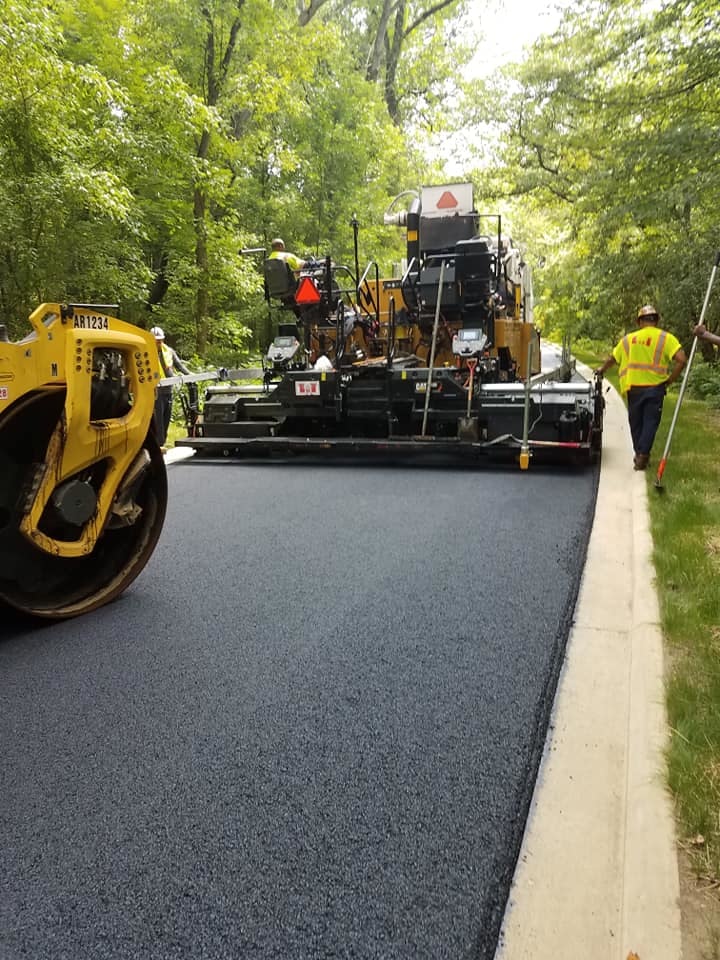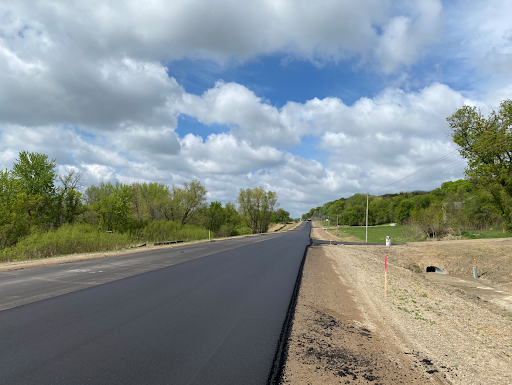Elevate Curb Appeal and Functionality: Hot Mix Asphalt for Regrading Projects
Wiki Article
Exploring the Ecological Benefits of Hot Mix Asphalt
The application of Hot Mix Asphalt in infrastructure jobs presents a compelling case for sustainable development and ecological stewardship. By delving right into the elaborate details of its manufacturing processes and the ingenious use of recycled materials, a much deeper understanding emerges of exactly how this innovation exceeds mere surface area applications. The environmental benefits of Hot Mix Asphalt prolong much past preliminary perceptions, offering a nuanced perspective on just how this material can lead the way for a greener future.
Reduced Greenhouse Gas Emissions
Warm Mix Asphalt production provides a substantial decrease in greenhouse gas discharges compared to other sidewalk products. The manufacturing procedure of Warm Mix Asphalt involves heating the combination of accumulation and asphalt binder to heats. This process requires less power contrasted to the manufacturing of alternative sidewalk products, leading to lower greenhouse gas emissions. Additionally, the use of recycled materials in Warm Mix Asphalt even more adds to reducing its ecological influence. By incorporating redeemed asphalt sidewalk and recycled asphalt roof shingles into the mix, the need for virgin products is decreased, bring about energy financial savings and lowered exhausts related to removal and handling.Researches have actually shown that Warm Mix Asphalt pavements have a smaller carbon impact over their life process compared to various other sidewalk choices. The longevity and recyclability of Warm Mix Asphalt better boost its environmental benefits by reducing the requirement for frequent upkeep or replacement, therefore conserving sources and minimizing discharges associated with restoration activities.
Power Effectiveness and Conservation
The manufacturing procedure of Warm Mix Asphalt not only reduces greenhouse gas discharges but also contributes significantly to power effectiveness and conservation efforts. Power effectiveness is a crucial advantage of Hot Mix Asphalt manufacturing contrasted to various other pavement types. The sturdiness of Warm Mix Asphalt reduces the regularity of upkeep and restoration, leading to long-term power savings.Sustainable Pavement Solutions

One secret aspect of sustainable sidewalk options is using recycled materials such as redeemed asphalt pavement (RAP) and recycled asphalt shingles (RAS) By including these products into the asphalt mixes, the need for virgin sources is minimized, bring about lower energy consumption and greenhouse gas emissions during production. Additionally, the reuse of these products assists divert waste from land fills, contributing to a much more sustainable and circular economic situation.
Moreover, lasting pavement services concentrate on optimizing sidewalk style to boost efficiency and longevity. Strategies such as warm mix asphalt (WMA) and rock mastic asphalt (SMA) improve the sturdiness and strength of pavements, minimizing the demand for frequent repair work and replacements. By carrying out these cutting-edge methods, facilities programmers can develop pavements that not only fulfill high-performance standards but also lessen their ecological impact.
Minimized Environmental Effect
Warm mix asphalt, in specific, uses several advantages that add to minimizing the general environmental impact of roadway infrastructure. One key element is the recyclability of asphalt, which can be recycled multiple times without compromising its high quality - Regrading.Moreover, the manufacturing of hot mix asphalt produces lower levels of greenhouse gases contrasted to various other sidewalk materials, making it a more eco-friendly alternative. The energy performance of asphalt plants has actually additionally enhanced throughout the years, causing decreased fuel consumption and lower exhausts. Additionally, the smooth surface area of hot mix asphalt lowers rolling resistance for automobiles, leading to lower gas consumption and decreased air pollution from automobile discharges.
Payment to Environment Adjustment Mitigation
Hot mix asphalt plays a critical role in mitigating climate modification with its lasting homes and reduced ecological impact. One substantial contribution to climate change mitigation comes from the power efficiency of hot mix asphalt production. Compared to other sidewalk alternatives, the production procedure for hot mix asphalt eats less power and produces lower levels of greenhouse gases, therefore minimizing its total carbon footprint.
Additionally, hot regrading mix asphalt's capability to reflect sunshine, referred to as albedo, aids in decreasing city warmth island effects. By decreasing heat absorption and retention, hot mix asphalt sidewalks can decrease the demand for air conditioning in city areas, as a result decreasing greenhouse gas emissions related to energy usage for cooling functions.
Furthermore, the toughness and recyclability of warm mix asphalt even more boost its climate adjustment mitigation capacities. Regrading. The lengthy lifespan of asphalt sidewalks lowers the requirement for regular repair services or substitutes, inevitably reducing the carbon emissions connected to road upkeep activities. The recyclability of asphalt materials reduces the need for virgin resources and reduces the environmental impact of sidewalk building and construction, straightening with sustainable methods for environment change reduction.
Conclusion
To conclude, the ecological advantages of Hot Mix Asphalt show its substantial payment to lowering greenhouse gas exhausts, saving energy, and lessening ecological effect. This lasting pavement remedy aligns with climate adjustment mitigation initiatives, advertises resource preservation, and improves framework advancement. By making use of recycled products, energy-efficient manufacturing processes, and sturdy style, Warm Mix Asphalt plays a crucial function in cultivating a much more eco-friendly method to infrastructure building and construction.The production process of Hot Mix Asphalt includes heating the blend of accumulation and asphalt binder to high temperature levels. By incorporating reclaimed asphalt pavement and recycled asphalt roof shingles into the mix, the demand for virgin products is reduced, leading to power cost savings and reduced discharges linked with extraction and processing.
One key element of lasting pavement solutions is the use of recycled products such as redeemed asphalt sidewalk (RAP) and recycled asphalt roof shingles (RAS) Methods such as cozy mix asphalt (WMA) and rock mastic asphalt (SMA) boost the sturdiness and durability of pavements, lowering the requirement for frequent repairs and replacements. Compared to other sidewalk alternatives, the manufacturing process for warm mix asphalt consumes less energy and discharges reduced levels of greenhouse gases, thus lowering its total carbon impact.
Report this wiki page